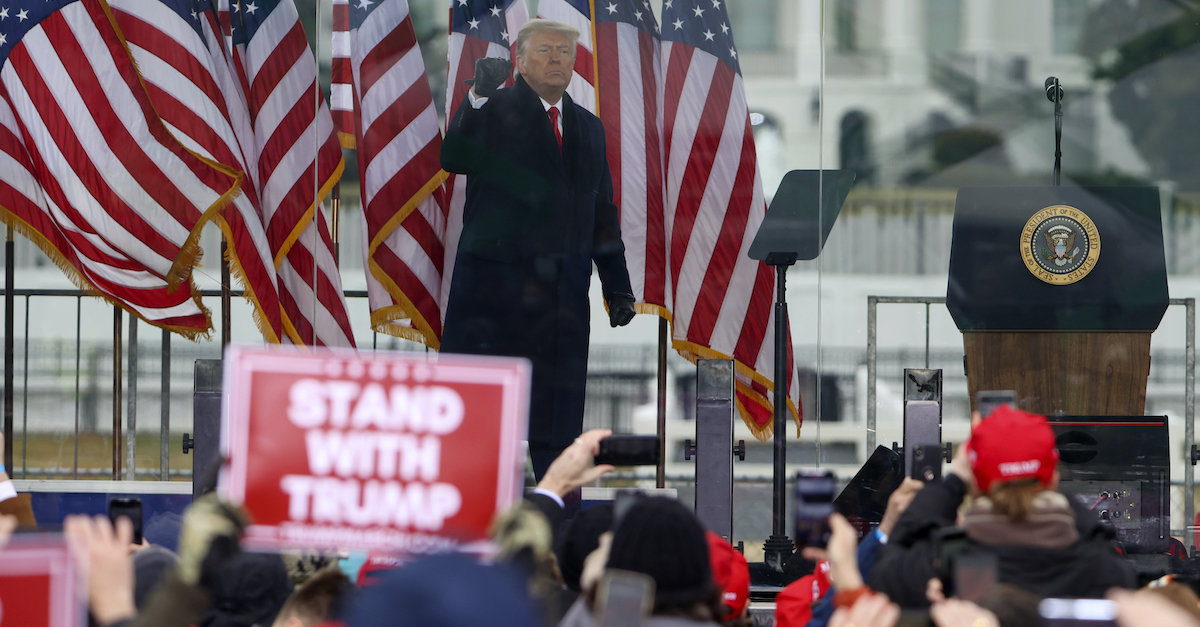
Another U.S. Capitol Police officer, a 10-year veteran of the law enforcement agency, sued former President Donald Trump under the Ku Klux Klan Act for having “inflamed, encouraged, incited, directed, and aided and abetted” a violent mob’s siege on Jan. 6, leaving him and other officers with lasting physical and mental injuries.
“As he walked out of the Capitol, his ears rang, his skin and throat burned, and his body ached,” Officer Marcus J. Moore’s legal team wrote in a 49-page complaint. “The Capitol was bathed in crime scene floodlights, SWAT teams and military, and a new perimeter.”
“He was overcome by the cognitive dissonance between what he thought he had known about the world when he started work on January 6, and what he had experienced throughout the day,” it continues. “He said aloud to himself ‘What just happened? What country am I in?'”
Filed two days before the one-year anniversary of Jan. 6, Marcus called Trump responsible for the “insurrectionist mob,” suing the former president for directing assault and battery, aiding and abetting assault and battery, inciting to riot, disorderly conduct, and two conspiracy counts. The first such count is under the Ku Klux Klan Act, the Reconstruction-era law punishing conspiring to interfere with civil rights.
According to the lawsuit, Trump’s supporters understood his Dec. 19th tweet—”Big protest in D.C. on January 6. Be there, will be wild!”—as a “literal call to arms.” Court papers in criminal cases against members of the Oath Keepers show one militia member responding “He wants us to make it WILD that’s what he’s saying.”
Moore is far from the first law enforcement officer to level such accusations against Trump in connection with Jan. 6 attack on the U.S. Capitol.
In August 2021, a coalition of seven other Capitol Police officers—Conrad Smith, Danny McElroy, Byron Evans, Governor Latson, Melissa Marshall, Michael Fortune, and Jason DeRoche—also sued Trump, his campaign, self-proclaimed dirty trickster Roger Stone, the Proud Boys and others under the KKK Act.
Combined, the septet had spent nearly 160 years in the Capitol Police force.
In February, Rep. Bennie Thompson (D-Miss.), before becoming the chairman of the House Select Committee to Investigate the Jan. 6 Attack on the U.S. Capitol, filed a lawsuit against Trump under the same statute. Thompson also sued Trump’s lawyer Rudy Giuliani, the Proud Boys and the Oath Keepers. The Mississippi Democrat later left his legal action in the hands of fellow Congress members in July, in order to avoid a possible conflict of interest.
Like hundreds of other law enforcement officers that day, Moore says that the pro-Trump mob assaulted him.
“The mob suddenly rushed Officer Moore and the other officers, as the officers back pedaled toward the vestibule to the House chambers,” his 49-page complaint states. “The insurrectionists crushed Moore against the wall. The combination of the crush of people pinning him to the wall and overwhelming chemical odor from bear spray and other chemicals, made it difficult for him to breathe.”
Moore said that he “could see one was armed carrying a gun.”
“He feared the mob was so intent on violence, he might not make it home alive,” the complaint states.
The veteran officer describes continuing to experience a physical and mental fallout from the siege.
“Officer Moore suffered injuries to his body, including persistent tinnitus, a condition that causes ringing in his ears,” the complaint says. “He continues to suffer a severe emotional toll in the wake of the January 6 insurrection.”
“He is haunted by the memory of being attacked, and of the sensory impacts—most particularly the explosions of flashbangs and other devices, as well as the sights, sounds, smells, and even tastes of the attack remain close to the surface,” the lawsuit continues.
This toll also has manifested in psychological trauma, he says.
“He suffered from depression that he could not address because he was too consumed with a sense of obligation to continue with his professional responsibilities,” the lawsuit states. “Because the attack happened in the place to which he reports daily, he is unable to avoid most of the triggers of his emotional reactions.”
He is represented by Washington, D.C.-based attorney Patrick A. Malone.
Trump’s attorney Jesse Binnall did not immediately respond to an email requesting comment.
Read the complaint, below:
(Photo by Tasos Katopodis/Getty Images)